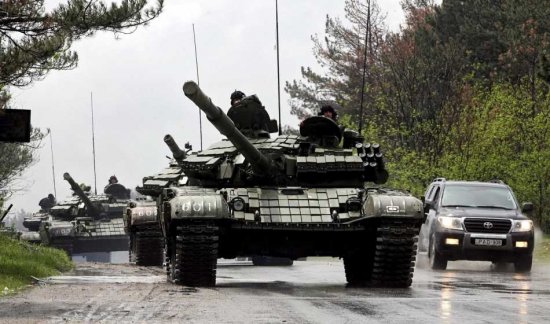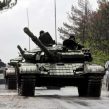
Moscow Playing Hard-Ball in its Quasi-Partnership with NATO
Publication: Eurasia Daily Monitor Volume: 6 Issue: 87
By:

The last thing that NATO needed on the eve of its controversial military exercises in Georgia was a mutiny, and that is exactly what happened yesterday. The details are still scarce and rumors run rife, as they always do in the South Caucasus, but perhaps the only definite conclusion is that Russia’s warnings about the "destabilizing character" of such exercises in Georgia -still in shock and denial after the August war- have suddenly acquired credibility. That does not make Moscow the mastermind behind an alleged coup, and President Mikhail Saakashvili’s accusations may reveal more about his state of mind than about the activities of Russian special services, which are hardly capable of penetrating into the United States-trained Georgian brigades (www.lenta.ru, May 5; Kommersant, Ezhednevny Zhurnal, May 6). The "episode" will most probably blow over, leaving only a minor trace of bad publicity, but it confirms to Moscow that NATO is caught in a triple trap – and has no escape strategy.
Afghanistan certainly constitutes the main jaws of this trap, but Moscow -after orchestrating the closure of the U.S. airbase at Manas, Kyrgyzstan- has refrained from any actions that could further complicate NATO’s under-strength operations. While U.S. President Barack Obama is pressing European allies for greater contributions, he is -as well as they are- perfectly aware that the sustainability of their collective effort is increasingly dependent upon Moscow’s good-will, since more supplies have to be delivered through the northern routes. That sets the second part of NATO’s trap: the Alliance needs constructive relations with Russia, while Moscow finds perfectly good reasons for exploiting tensions. Thus the "spy scandal" involving two Russian diplomats being expelled from Brussels after an intelligence operation had been exposed in Estonia was escalated beyond the usual "reciprocity" as Foreign Minister Sergei Lavrov cancelled his participation in the planned "revival-of-partnership" session of the NATO-Russia Council (RIA-Novosti, May 5).
Georgia constitutes the last element of the trap, as NATO cannot withdraw its commitment to help the country in preparing for future membership and in repairing the war-inflicted damage, while attempting to avoid the bitter conflict between Saakashvili and the opposition. The Alliance also struggles to minimize the negative fallout in its relations with Russia (Kommersant, April 23). President Dmitry Medvedev did not mince words calling the NATO exercises a "blatant provocation," and Russia -much like in July 2008- staged its own exercises, but its main response had an unexpectedly asymmetric character.
At a special ceremony in the Kremlin, Medvedev signed agreements with the leaders of Abkhzia and South Ossetia on "delegating" to Russia the responsibility for protecting their borders (Vremya Novostei, May 5). Protestations from the U.S. and NATO were firmly dismissed, and Russian border troops swiftly moved to establish checkpoints and set up permanent quarters. This step directly violates what remains of Georgia’s territorial integrity, but in fact Moscow had very little choice. There are no legal grounds for re-establishing Russian peace-keeping operations, but leaving border control in the hands of the Abkhazian and South Ossetian para-militaries would have been a recipe for endless incidents, which only a handful of poorly trained EU monitors were unable to prevent. Now the risk of cross-border raids and shootouts are practically eliminated, which is in everyone’s interests, but NATO still feels obliged to sympathize with Georgian lamentations about "occupation."
Medvedev knows that every anti-NATO invective scores him a point in public opinion since there is a strong majority – 62 percent (up from 58 percent last October) according to a recent Levada Center poll – which believes that the Alliance constitutes a source of threat to Russia (www.levada.ru, April 1). There are, nevertheless, serious drawbacks in picking a quarrel with NATO over Georgia, and one of them is the rekindled instability in the North Caucasus. The much-trumpeted ending of the "counter-terrorist operation" in Chechnya has not signified its real pacification. In several districts the same conditions are now being reactivated; Moscow’s ability to control Ramzan Kadyrov, Chechnya’s maverick president, has distinctly diminished (Vremya Novostei, April 29). The under-reported spread of Islamic radicalism in Dagestan may be even more dangerous, and the looming deficit in the state budget denies the federal center the opportunity to buy the loyalty of the local elites (Novaya Gazeta, April 24). Regional authorities all over the vast country feel a squeeze on their budgets, and in the North Caucasus questions about the priority financing of South Ossetia will inevitably be raised (www.gazeta.ru, May 5).
Another serious drawback, that Medvedev is trying to ignore but should be very worried about, is the brewing discontent within the armed forces that are subjected to long-postponed but unduly rushed reforms. Massive funding was promised for easing the pain from the draconian cuts within the officer corps, and now these promises are being quietly withdrawn, forcing the resignation of Lybov Kudelina, deputy defense minister in charge of financing (Nezavisimoe voennoe obozrenie, April 24; Ezhednevny Zhurnal, May 5). Escalating tensions with NATO provides an unhelpful background for these reforms, as the discontent among the top brass blends with the artificially hyped "threat perceptions" and the resulting "patriotic mobilization" could generate far more powerful outbursts than an alleged coup d’etat in Tbilisi.
The principled non-cooperative attitude towards NATO has been a key element of Putin’s assertive "take-that" foreign policy, launched with the famous "Munich speech" in February 2007. This policy is still very popular as it deliberately plays on the peculiar mix of superiority and inferiority complexes within an often contradictory Russian public opinion. Consequently, Medvedev dares not to step away from the "down-with-NATO" line. The downward spiraling economic crisis, however, inevitably destroys the foundation of this policy, as Russia does not have any justification to see itself as a rising power, even in comparison with "ungovernable Georgia" or "forever-squabbling Ukraine." The reckoning with this unpleasant reality can be postponed only for so long, and Medvedev’s smart tactics of advancing a limited "liberalization" at home and demonstrating toughness abroad cannot be sustained throughout the second year of his accidental presidency.




